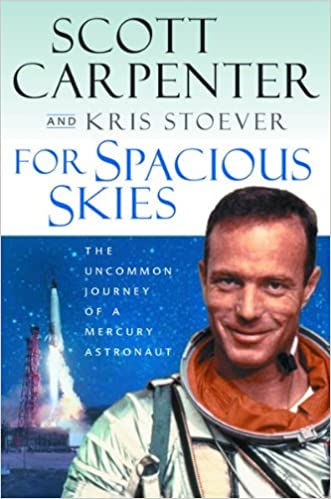Book Review - “For Spacious Skies: The Uncommon Journey of a Mercury Astronaut.” Scott Carpenter and Kris Stoever, 2003.
Scott Carpenter was a lovely, kind, gentle man in person. In our personal conversations, he slowly considered everything said to him and his replies were thoughtful, poetic, and perfect. His daughter Kris is an incredible, insightful writer, and one of the best copyeditors I have ever collaborated with – no detail escapes her. The combination of the two makes for this incredible book.
Following the publication of Gordon Cooper’s autobiography in 2000, there remained only one Mercury astronaut who had not written his own book about his experiences. Many wondered if Scott Carpenter, in many ways the most enigmatic of the astronauts from that era, would ever do so. He had, after all, come under withering fire when former NASA Flight Director Chris Kraft published his memoirs the following year. Kraft devoted an entire chapter to tearing apart Carpenter’s performance in orbit. Most people with a firm grasp of the facts of that mission felt that Kraft had gone way, way too far.
Carpenter had endured many such remarks in the four decades since his flight, but always with a tight-lipped good grace. This book, however, finally provided the polite yet powerful takedown of the most egregious rumors and myths.
Carpenter had a childhood that was so troubled, it made for a fascinating read in itself. Carpenter’s mother had tuberculosis in an era before life-saving antibiotics, and his father was always away, looking for work. The letters they wrote to each other portray a splintering, disintegrating marriage in which young Scott could not rely on either of his parents. I would have been drawn into this book even if he had never gone on to an interesting career.
But it gets better. Because for this man to become one of the first astronauts – the first, in fact, to ever have his name called out publicly to the press – is about as fascinating as it gets. Carpenter was different. He was an accomplished pilot, but he did not fit the Right Stuff stereotype. He was artistic, mindful, and curious. He was much more like some of the science-minded pilots that came into the space program later and made incredible contributions. But he was instead there at the beginning, a time when NASA were still learning as they went what an astronaut should be. As such, he was a fascinating anomaly. NASA could have taken his lead and allowed the pilot to decide the limits of his craft. They chose instead to direct the flight more closely from Mission Control. Carpenter, in control of his mission and its outcome, could not control the office politics of the time. He flew in space once, before moving on to other adventures.
Over the decades, he was maligned by many for what they saw as a failure to follow the rules during his space mission. Carpenter saw it differently, and describes clearly what did actually happen on his flight, backed up by the impartial engineering mission reports of the time.
I was invited to the party for the book’s launch, and it was there I saw a different, powerful side of Carpenter. This gentle man began talking about what had happened to him after his flight, and I saw his passion and long-held feeling of deep injustice surface. On the one hand, it was a private event and I took it for what it was – Carpenter talking in a safe place to trusted friends. But the writer side of me wished it had been recorded, because his damning testimony of how his career had been skewed by others was one of the most measured-yet-blistering speeches I have ever witnessed. I hope this book was a catharsis.
His life is a fascinating tale, written with lucidity and artistry.
